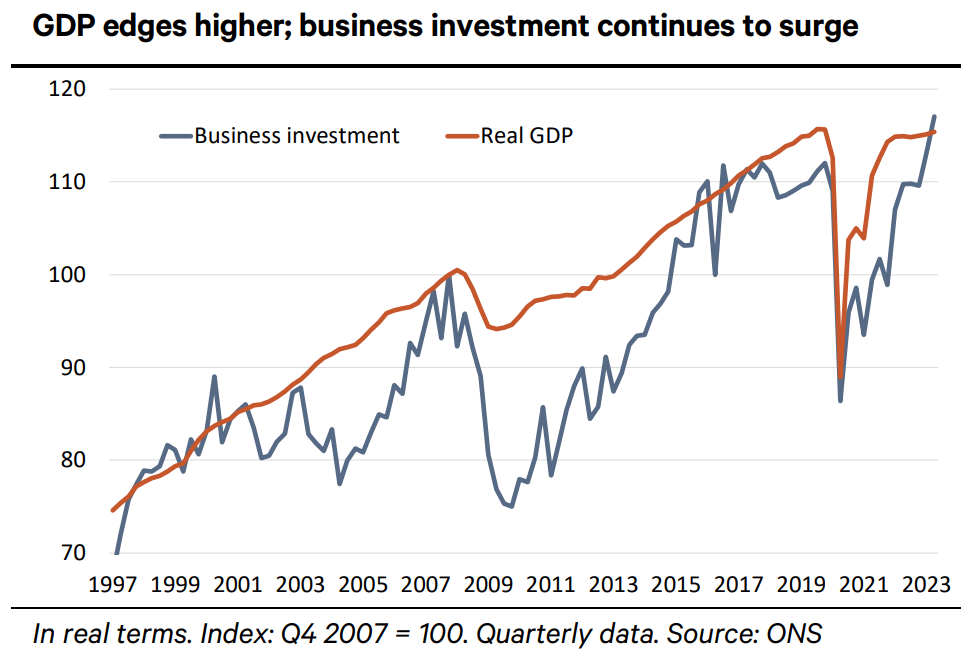UK Economy: Business "Investment Boom" Underway says Berenberg
- Written by: Gary Howes

Image © Adobe Images
A business investment boom might be underway in the UK as businesses utilise their considerable cash balances amidst an improved political landscape and despite rising interest rates.
The ONS reported the UK saw a 3.4% quarter-on-quarter increase in business investment - far higher than the 0.8% boost the market was looking for - in the second quarter as a positive trend extended, raising hopes that an improvement in the UK's sclerotic productivity rate will ultimately follow suit.
"The latest data indicate that the post-COVID snapback in investment may be turning into a genuine investment boom," says Holger Schmieding, Chief Economist at Berenberg Bank.
To be sure, the Q2 boost was driven by the transportation sector, most notably aviation, which can be volatile. Furthermore, investment in ICT equipment and other machinery equipment declined.
But it must be kept in mind too that there was a sizeable bump in business investment in the first quarter as firms raced to beat the expiration of the super-deduction allowance which offered generous tax breaks for investing in equipment.
Therefore some pullback was already expected, yet the Q2 figure easily exceeded expectations.
The trend is clear: Berenberg's analysis shows business investment has surged by 35% from the Q2 2020 low and is now 6% above its pre-Brexit-vote high.
"Productivity-enhancing business investment stalled badly after the UK voted to leave the EU, and then collapsed during the first wave of COVID-19 in early 2020. The weakness in investment has hurt productivity, harmed supply potential and contributed to inflation pressures," explains Schmieding.
However, he says the latest data indicate that the post-COVID snapback in investment may be turning "into a genuine investment boom".
The 35% surge from the Q2 2020 low comes despite rising interest rates and Berenberg's economists say can be explained by cash balances that are now worth c25% of GDP and corporate debt-to-GDP at a 25-year low.
These healthy bank account balances provide businesses "with ample space to raise investment spending" in response to rising labour costs and pricing power in final markets.
"Fading political uncertainty, combined with economic recovery, can underpin further strong investment gains," says Schmieding.
The business investment data was contained in a set of accounts released by the ONS that showed the UK economy unexpectedly accelerated 0.5% in June, lifting second-quarter growth to 0.2%.
"Is it time to turn less pessimistic on the UK? Yes, we think so," says Schmieding. "Half-deservedly, the UK has developed a reputation as a bit of a basket case among major advanced economies since voting for Brexit."
Why only half-deservedly? "Because even though UK politics may have descended at times to lows that once would have been almost unfathomable, economic performance never quite matched the politics," explains Schmieding.
He notes the UK's economic performance is consistently beating often overly pessimistic expectations.
"Now that the political situation is returning to normal, economic recovery combined with easing inflation pressures can underpin financial markets turning more positive (or at least less negative) on the UK. Over time, this should support gains in UK risk assets, as well as sterling," says Schmieding.




